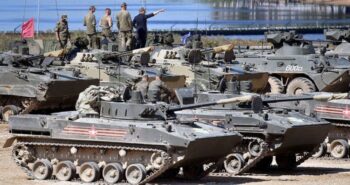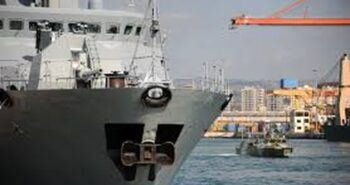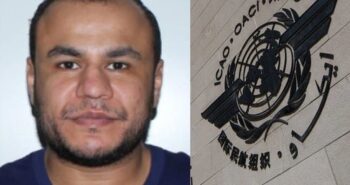By Benoit Faucon & Ian Talley
 Governments have been tracking Libyan militia leader Khalifa Haftar’s private jet, which is suspected of moving gold from Venezuela to West Africa, and from there to Europe and the Middle East, security officials said.
Governments have been tracking Libyan militia leader Khalifa Haftar’s private jet, which is suspected of moving gold from Venezuela to West Africa, and from there to Europe and the Middle East, security officials said.
Libya and the U.S. are investigating suspected gold-for-cash trades between Venezuela and Libyan militia leader Khalifa Haftar, security officials said.
The Libyan government, with the help of the United Nations and the U.S., has been tracking Mr. Haftar’s private jet, which is suspected of carrying gold from Venezuela to West Africa, and from there to Europe and the Middle East, U.S., European and Libyan security officials said.
Libya’s attorney general has opened an investigation into information that suggests Mr. Haftar’s eastern Libya-based faction has been bartering U.S. dollars for Venezuelan gold. The country’s interior minister, Fathi Bashagha, said Thursday that the inquiry was initiated at his request.
“Venezuela is under U.S. sanctions so we have to open an investigation,” Mr. Bashagha said.
The U.S. State Department has said publicly that it has been looking at flight-tracking suggesting Mr. Haftar’s jet traveled to Caracas. “We’ve been tracking those reports on Haftar’s trip—alleged trip to Venezuela,” said David Schenker, the department’s assistant secretary for near eastern bureau said at a June 11 press call. “The allegations are concerning.”
The State Department didn’t respond to a request for comment.
Representatives for Mr. Haftar’s faction, the Libyan National Army, and the office of Venezuelan president Nicolás Maduro didn’t respond to requests for comment.
Mr. Maduro’s government is mired in an economic crisis marked by widespread malnutrition and runaway inflation. The U.S. is seeking to replace Mr. Maduro with Juan Guaidó, a U.S. ally. But the Maduro regime has endured, even as the coronavirus pandemic and a crash in oil prices have compounded the impact of a U.S. oil embargo on its chief export.
Mr. Maduro has reached out across the world for help, where he has sometimes sought assistance from U.S. foes such as Iran and Russia. Last week, U.S. federal prosecutors filed suit to seize four tankers-worth of Iranian gasoline heading to Venezuela.
Intelligence reports suggest associates of the militia leader airlifted U.S. dollars to Caracas, said Mr. Bashagha and Western security officials.
“Haftar has been concerned his accounts could be frozen if he comes under sanctions” and would prefer to have gold, which is more difficult to track, a European security official said.
Mr. Haftar was a high-ranking military officer under the leadership of late Libyan leader Moammar Gadhafi, whose rule ended in 2011. Since 2014, he has waged civil war on the internationally recognized Libyan government, seeking to restore authoritarian rule. Mr. Haftar has become notorious amid allegations of human rights violations and attempts to export oil in violation of sanctions.
Initial reports suggest Mr. Haftar’s associates have traveled repeatedly to Caracas, where they are suspected to have loaded gold, said Libya’s Mr. Bashagha and the Western security officials. Officials say the precious metal appeared to have been shipped to vaults in Switzerland and in the United Arab Emirates.
In one instance, Mr. Haftar’s private jet traveled on April 24 to Caracas before flying to Switzerland three days later, before landing in the United Arab Emirates in early May, according to flight tracking from C4ADS, a nonprofit organization providing data-driven analysis on transnational security issues.
The connection between the Venezuelan regime and Mr. Haftar was allegedly fostered by Mustafa Zaidi, a former health minister under Gadhafi, the security officials said.
Mr. Zaidi told The Wall Street Journal that he had developed relationships with the Venezuelan government during the Libya revolution in 2011 but he was no longer in contact with any of its members.
After the revolution, Mr. Zaidi assembled a group of Gadhafi loyalists in a faction called the Libyan Popular National Movement that now backs Mr. Haftar. According to letters posted on his Facebook page, he also nurtured relationships with Cuba and Venezuela.
In a posting on his Movement’s Facebook account in March, Mr. Zaidi left a message of support for Diosdado Cabello, the president of Venezuela’s National Constituent Assembly, who is wanted by the U.S. for alleged involvement in drug trafficking. In a subsequent Facebook post, Mr. Zaidi said Mr. Cabello had thanked him for his support.
Mr. Zaidi said he couldn’t remember the recent social media postings about Mr. Cabello. “I write to a lot of people,” he said.
***
Benoit Faucon– Senior reporter, The Wall Street Journal. He covers OPEC and the oil industries of Iran, Libya, Nigeria and Algeria. He has also strayed into investigative stories such as pharmaceutical counterfeits, money laundering or terror finance.
Ian Talley writes about sanctions, terror finance and other global illicit finance networks from the Wall Street Journal’s Washington, DC bureau.
— Summer Said in Dubai contributed to this article.
******
Libya and US investigate suspected gold for cash trade between Venezuela and Haftar: Report
 Security officials believe the Libyan eastern commander preferred gold over cash as it was more difficult to track
Security officials believe the Libyan eastern commander preferred gold over cash as it was more difficult to track
Libyan and US authorities have launched an investigation into suspected gold-for-cash trades between Venezuela and Libyan eastern commander Khalifa Haftar.
Security officials from the United States, Europe and Libya told the Wall Street Journal that the Libyan government had been tracking Haftar’s private jet, with the help of the United Nations and Washington.
Haftar’s jet was suspected of carrying gold from Venezuela to West Africa, which then went to Europe and the Middle East, according to the officials.
Libya’s attorney general opened an investigation into claims that Hafar was trading US dollars for Venezuelan gold. Libyan Interior Minister Fathi Bashagha on Thursday said that the investigation was initiated at the request of the attorney general.
“Venezuela is under US sanctions so we have to open an investigation,” said Bashagha.
Libyan and European security officials told the WSJ that Haftar’s associates had airlifted dollars to Caracas due to fears that “his accounts could be frozen if he comes under sanctions”.
The official noted that Haftar preferred to keep his assets in gold as it is more difficult to track.
The US State Department said publicly that it had been looking into flight tracking that suggests Haftar’s jets had gone to Caracas.
“We’ve been tracking those reports on Haftar’s trip – alleged trip – to Venezuela,” David Schenker, the US State Department’s assistant secretary for the Bureau of Near Eastern Affairs, said in early June.
Haftar, who was once a high ranking military official under former ruler Gaddafi before being exiled to the US, has waged a civil war since 2014 against the UN-backed Government of National Accord (GNA).
Officials told the WSJ that the Venezualan gold had been shipped to vaults in Switzerland and the United Arab Emirates.
One instance showed Haftar’s jet had travelled on 24 April to Caracas before flying to Switzerland three days later, later landing in the UAE in early May, according to flight tracking from C4ADS, a nonprofit group that gives data-driven analysis on transnational security issues.
After a string of defeats, Haftar’s forces were forced to retreat from the outskirts of Tripoli in early June, capping a sudden collapse of his 14-month offensive against the capital.
Earlier this week, Libyan officials told Middle East Eye that hundreds of bodies and other human remains had been recovered in Tarhuna, an area the GNA recently captured from Haftar’s forces.
“These cemeteries include hundreds of bodies including women and children. The government believes those victims have been killed by Haftar’s militia,” said a GNA official.
GNA forces also found at least 158 corpses, including the bodies of women and children, in Tarhuna hospital hours after Haftar’s forces fled the city, according to GNA officials. They said the bodies appeared to have been executed and also displayed signs of torture.
___________




